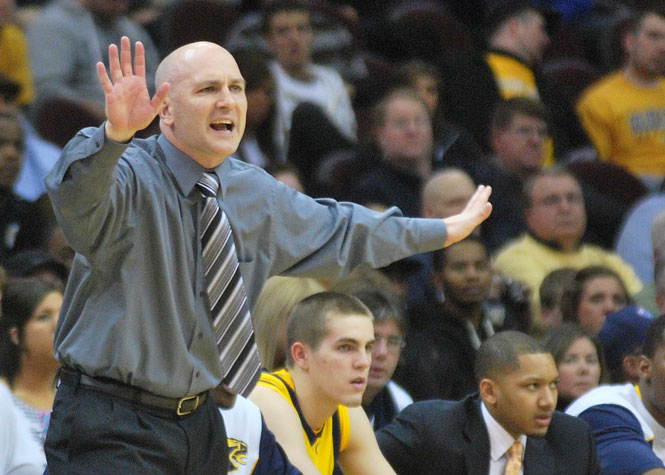Former men’s basketball coach owes Kent State $1.2 million in damages, appeals court rules
January 15, 2015
Former Kent State men’s basketball coach Geno Ford once led the Flashes to two consecutive regular season Mid-American Conference Championships in his three-season stint, but now the former 2010 and 2011 MAC Coach of the Year owes the university money.
A divided state appeals court upheld a $1.2 million judgment for Kent State against Ford over a breach of contract Tuesday in Columbus, according to court documents from the case Kent State Univ. v. Ford.
The 11th District Court of Appeals ruled that Ford, who left Kent State in 2011 to pursue the men’s basketball head coaching position at Bradley University — a private university in Peoria, Illinois – owes Kent State for the four years remaining on his contract. The court agreed with the October 2013 summary judgment delivered by now-retired Portage County Common Pleas Judge John Enlow, according to the Akron Beacon Journal.
“We believe the court’s decision speaks for itself,” Kent State spokesman Eric Mansfield said.
Susan Audey, Ford’s attorney, said she had no comment, according to Northeast Ohio Media Group.
Bobby Parker, Bradley University associate athletic director for communications, said neither he nor Ford “have anything to offer” and declined to comment on the court’s decision.
Filing a complaint
On April 26, 2011, Kent State filed a complaint against Ford and Bradley University, saying Ford breached his contract by leaving Kent State four years early, according to the the court documents.
Kent State dropped the lawsuit against Bradley University in October 2013.
Kent State sought damages against Ford when he announced his departure in March 2011. Ford’s contract contained a clause that required Ford to pay back part of his salary multiplied by the number of years left on his contract if he were to leave early, according to the court documents.
Ford was named the Kent State men’s basketball head coach back in 2008 and signed a four-year contract with an option for a fifth year. In April 2010, Ford renegotiated his contract with Kent State for a five-year deal that increased his salary to $300,000 a year.
The case records show that while Ford attempted to change the damages clause from the negotiated contract, asking for a “graduated reduction” that would reduce the damages as he neared the end of the contract, according to court documents.
Yet the clause stayed, and Ford accepted the clause he previously agreed to and signed the new contract.
In March 2011, Kent State Athletic Director Joel Nielsen granted Ford permission to speak to Bradley after the end of next basketball season. According to court documents, on March 26, 2011, Ford told Nielsen about his talks with Bradley University and showed interest in coaching there. Nielsen said he reminded Ford about the damages provision in the contract at that time.
Despite Nielsen’s warnings, Ford was hired by Bradley University for $700,000 a year, and Nielsen hired now-coach Rob Senderoff in April 2011 to replace Ford.
The court’s decision
According to the court documents, Nielsen said the clause was intended to protect the university “by providing coaching continuity, which aids in recruiting players,” and Kent State’s previous athletic director Liang Kennedy also testified that the clause “protects the coach and the institution’s investment in the coach and the program.”
Former Kent State president Lester Lefton said that the money from the damages helps replace losses from advertising, ticket sales, recruiting and “‘having to start all over again’ when a coach leaves” before his contract is up, according to the court documents.
Asserting that there are often large “staff transitional costs” when a head coach leaves, as noted in Kent State’s then-executive associate athletic director Thomas Kleinlein’s testimony, Kent State claimed Ford owed it $1.2 million — or $300,000 for each of the four years left on his contract — and sued Ford for breach of contract.
Northeast Ohio Media Group said Ford argued that the school “suffered no damages and the damages clause was not enforceable because it served only as a penalty” to punish him for leaving early. He also argued that the clause was unenforceable because “a party cannot recover for a breach of contract when there is no proof of damages,” according to the court documents.
The trial court ordered Ford to pay the $1.2 million in damages to Kent State
The appeals court majority appellate decision, written by Judge Diane Grendell, said Kent State was justified in seeking damages for Kent State’s losses when a basketball coach leaves.
Grendell cited Ohio Supreme Court case Samson Sales, Inc. v. Honeywell, Inc. that established a three-part test for enforcing damages clauses, including that the contract isn’t “unreasonable or disproportionate in amount as to justify the conclusion that it does not express the true intention of the parties.”
In her majority opinion, Grendell concluded that the case law supports that the lower court properly enforced the damages clause.
Grendell further refuted Ford’s argument that a damages clause was unenforceable, writing that when a damages clause is in a contract, it is not required that actual damages be proven, according to court documents.
Judge Cynthia Westcott Rice agreed with Grendell.
Judge Timothy Cannon, however, dissented, writing that the damages clause used in the contract “neither suggests any reasonable estimate of Kent State’s probable losses nor describes in any way the specific areas of damage to be included in the estimate.”
In his dissenting opinion, Cannon said “there is significant evidence that Kent State did not make an effort, prior to or at the time of contracting, to identify either the types of damages or the amount of damages it would incur following a breach,” according to the court documents.
Contact Richie Mulhall at [email protected].

























